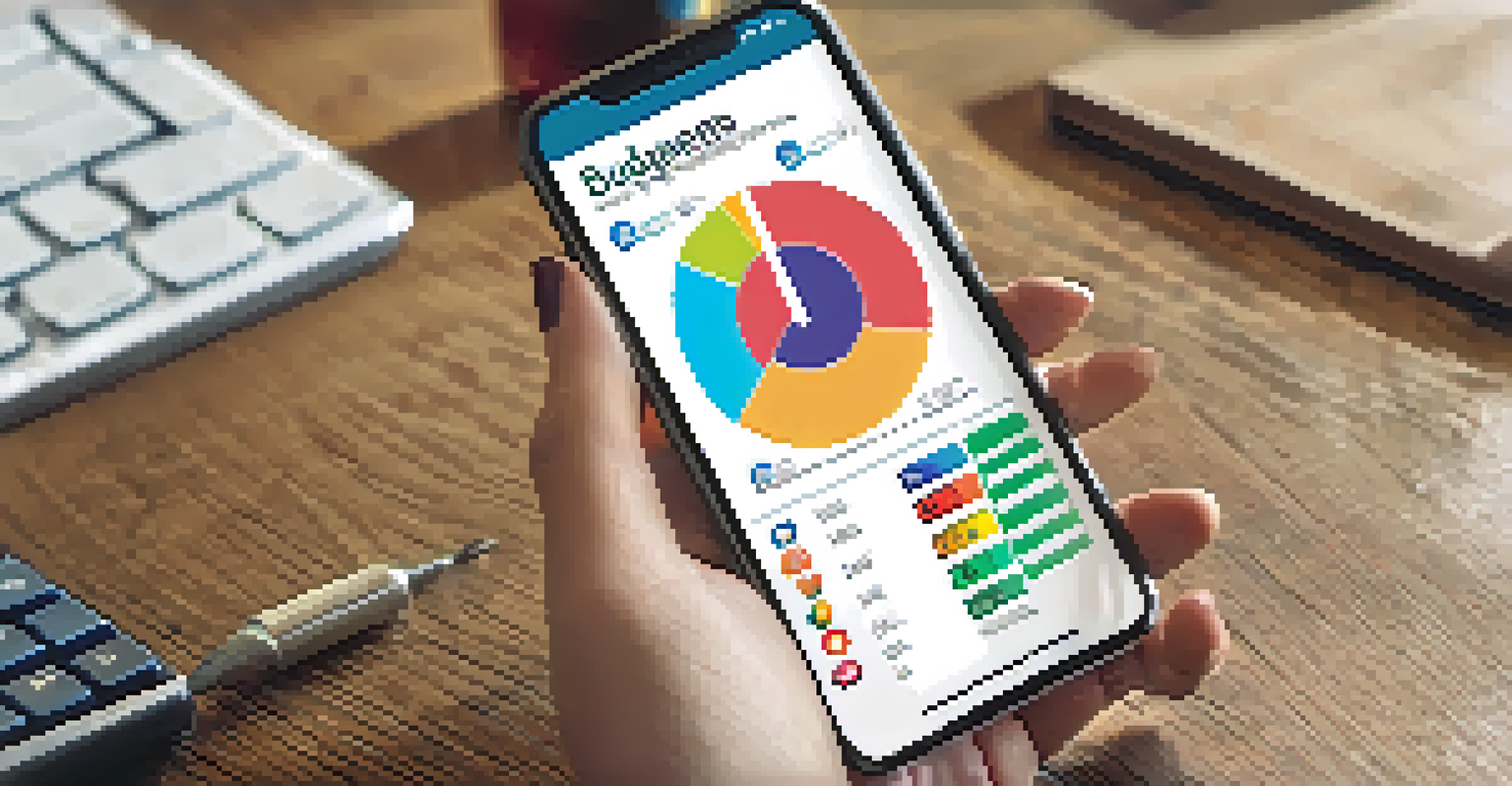The Importance of Budgeting for Effective Money Management

Understanding Budgeting: The Foundation of Financial Health
Budgeting is the process of creating a plan for your money, detailing how much you earn and spend. It's like drawing a roadmap for your finances, helping you navigate your income, expenses, and savings. Without a budget, it's easy to lose track of where your money goes, leading to financial stress and uncertainty.
A budget is telling your money where to go instead of wondering where it went.
When you have a clear budget in place, you can identify your spending habits and make informed decisions. Whether you’re saving for a vacation, paying off debt, or planning for retirement, a budget gives you the clarity and direction needed to achieve your financial goals. Think of it as a tool that empowers you to take control of your financial future.
Moreover, budgeting isn't just about restriction; it's about freedom. By understanding your financial landscape, you can allocate resources towards what truly matters to you, whether that's travel, education, or simply enjoying life. A budget helps you prioritize and make choices that align with your values.
The Benefits of Budgeting: More Than Just Numbers
One of the greatest benefits of budgeting is that it reduces anxiety about money. Knowing exactly how much you have and where it’s going can alleviate worries about unexpected expenses. With a budget, you’re not just reacting to financial situations; you’re proactively managing them.

Budgeting also promotes savings and fosters a mindset of financial responsibility. By setting aside funds for emergencies or future goals, you're building a safety net that can provide peace of mind. For instance, having an emergency fund can prevent financial disasters when unexpected expenses arise.
Budgeting Empowers Financial Control
Creating a budget gives you clarity and direction, helping you take control of your financial future.
Additionally, budgeting can enhance your spending habits. By tracking your expenses, you may discover areas where you can cut back, allowing you to redirect those funds toward savings or investments. This process of reflection can turn impulse spending into intentional choices that benefit your financial wellness.
Setting Realistic Goals: The First Step in Budgeting
When starting a budget, it's essential to set realistic and achievable financial goals. This could range from saving for a new car to paying off credit card debt. By defining clear goals, you can tailor your budget to reflect your priorities and aspirations.
The secret to getting ahead is getting started.
For example, if your goal is to save for a vacation, you can allocate a specific amount each month towards that fund. This targeted approach not only makes saving feel more attainable but also keeps you motivated as you watch your progress unfold. Remember, the journey to financial stability is often a marathon, not a sprint.
Setting goals also encourages accountability. When you have something specific to work towards, it becomes easier to stay committed to your budget. Celebrate small milestones along the way to keep your enthusiasm alive and remind yourself of the bigger picture.
Tracking Your Expenses: The Key to Effective Budgeting
Once your budget is set, the next crucial step is tracking your expenses. This means diligently recording every purchase and bill, no matter how small. By doing this, you create a clear picture of your spending habits, allowing you to stay aligned with your budget.
There are various tools available, from budgeting apps to simple spreadsheets, that can help you keep tabs on your expenses. The key is to find a method that works for you and stick with it. Tracking your expenses regularly will ensure you stay on course and make any necessary adjustments to your budget.
Flexibility is Key to Budgeting Success
A budget should be adaptable to life's changes, allowing you to adjust your finances without stress.
Moreover, reviewing your expenses can uncover surprising insights about your financial behavior. Maybe you’re spending more on dining out than you realized, or perhaps there are subscriptions you no longer use. This awareness can empower you to make informed changes that better align with your financial goals.
Adjusting Your Budget: Flexibility is Essential
A budget is not a rigid document; it should be flexible and adaptable to your changing circumstances. Life is unpredictable, and your financial situation may evolve due to job changes, family needs, or unexpected expenses. Embracing flexibility allows you to adjust your budget as needed without feeling overwhelmed.
For instance, if you receive a raise, you might choose to allocate more towards savings or paying off debt. Conversely, if you face a temporary setback, like a medical expense, your budget should accommodate that change. The goal is to maintain balance while still working towards your financial objectives.
Regularly reviewing and adjusting your budget is also a great opportunity to reflect on your spending priorities. Are there areas where you can cut back? Or perhaps you want to invest more in something meaningful to you? This ongoing dialogue with your budget fosters a healthier relationship with money.
The Role of Emergency Funds in Your Budget
An essential component of effective budgeting is building an emergency fund. This fund acts as a financial safety net, providing peace of mind when unexpected expenses arise, such as medical bills or car repairs. Having an emergency fund is like having a financial cushion that can help you avoid debt when life throws a curveball.
Typically, financial experts recommend saving three to six months' worth of living expenses. This may seem daunting at first, but you can start small by setting aside a portion of your income each month. Over time, these contributions will add up, giving you the security you need.
Emergency Funds Provide Security
Building an emergency fund is essential for financial health, offering peace of mind during unexpected expenses.
Incorporating an emergency fund into your budget is a proactive strategy. It not only protects your financial health but also helps you stick to your budget during tough times. Knowing you have a fallback plan allows you to navigate financial challenges with greater confidence.
Staying Committed: The Long-Term Benefits of Budgeting
Staying committed to your budget can lead to significant long-term benefits. Consistency is key in building a strong financial foundation, and maintaining your budget helps reinforce healthy spending habits. Over time, these habits can translate into greater financial stability and freedom.
For example, if you stick to your budget and prioritize savings, you may find yourself in a position to invest in opportunities that align with your life goals, like buying a home or starting a business. Budgeting isn't just about managing your money; it’s about creating the life you desire.

Additionally, the discipline you develop through budgeting can have a ripple effect on other areas of your life. The skills learned in budgeting—like setting goals, planning, and making informed decisions—can enhance your overall personal and professional growth. In essence, budgeting equips you not just to handle money better, but to navigate life with confidence.